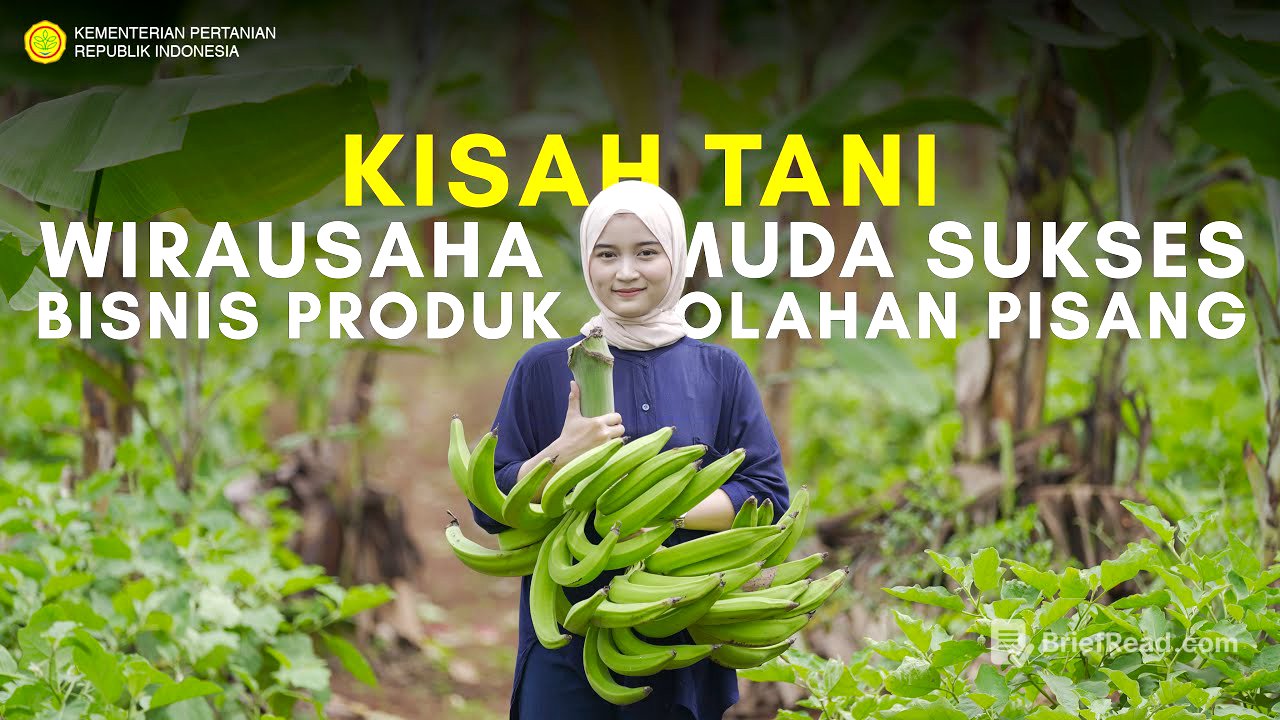TLDR;
Nurul Ihsani, CEO of PT Sane Rasa Pangan Indonesia, shares her journey of establishing a banana chips business ("Bye Nana") in 2020. Motivated by an abundance of unsold bananas and a desire to empower local women during the pandemic, she created a brand that now offers five flavors and employs many local women. She also discusses her involvement as an Ambassador for the Ministry of Agriculture, which has provided valuable networking and export opportunities. She emphasizes the importance of young people engaging in agriculture, viewing it as a sustainable and vital sector for Indonesia's future.
- Established "Bye Nana" banana chips business in 2020.
- Offers five flavors of banana chips and employs local women.
- Actively involved as an Ambassador for the Ministry of Agriculture.
- Advocates for youth involvement in agriculture for food security.
Inspiration and Founding of Bye Nana [0:00]
In December 2020, during the COVID-19 pandemic, Nurul Ihsani, a student at the time, returned to her hometown of Cianjur and identified two key problems: a surplus of unsold bananas and a lack of employment opportunities for local women. This led her to start a banana chips business called "Bye Nana". She wanted to utilize the local banana potential and provide income for women affected by layoffs. Her passion for sales and a desire to help her community drove her to create the brand.
Raw Materials and Agricultural Practices [2:11]
"Bye Nana" uses two types of bananas: horn bananas, sourced from their own garden, and cotton bananas, sourced from an area of 2,000 meters in Cianjur. The company also practices intercropping, growing pumpkins and papayas alongside bananas. Nurul expresses interest in developing jali-jali (Job's tears) as a rice substitute. PT Sani Rasa focuses on agriculture and processing, aiming to expand with other local commodities and cultivate their land effectively.
Benefits of the Ministry of Agriculture's Ambassador Program [3:31]
Nurul highlights the benefits of being an Ambassador for the Ministry of Agriculture, including digital marketing and agricultural training. She emphasizes the networking opportunities, which have led to knowledge sharing and potential business collaborations. The program has also facilitated her participation in an export incubator through Givi, providing guidance and resources for international trade, including access to Alibaba.
Sales, Distribution, and Export Plans [4:55]
"Bye Nana" has 50 partners across Indonesia and aims to begin exporting this year. While samples have been sent to Malaysia, the company is now participating in a fulfillment program to advance its national and international reach. Currently, 90% of sales are online, with the remaining 10% offline. The company utilizes resellers, agents, and distributors, and has also entered 37 Alfamart stores in Cianjur after being recognized as one of the top MSMEs. Additionally, "Bye Nana" products are available in cake and souvenir shops in Cianjur.
Banana Chips Production Process [6:16]
The production process involves peeling the bananas and soaking them in water to remove sap, preventing discoloration. After soaking, the bananas are drained before being sliced and immediately fried. This prevents the slices from sticking together, which can affect the chips' texture and shelf life. After frying, the chips are drained, seasoned with various flavors, and packed once cooled to prevent spoilage from evaporation.
Activities as an Agriculture Ambassador [8:23]
As an Ambassador, Nurul has participated in various activities, including meeting with investors, presenting materials at agricultural schools like Polbangtan Bogor and Yoma, and speaking at events in Magelang. She has also participated in Ministry of Agriculture jamborees, using the opportunity to open bazaars and increase sales. Offline meetings are held to discuss the role of young people in agriculture, encouraging them to be proactive and brave in pursuing their dreams.
Encouragement for Young Farmers [9:30]
Nurul encourages young people not to be discouraged by competition, emphasizing that while business ideas can be copied, success is unique to each individual. She advises young farmers to persevere and find their niche. She stresses the importance of agriculture as a sustainable and essential business for Indonesia's food security, urging young people not to be ashamed to engage in farming.









